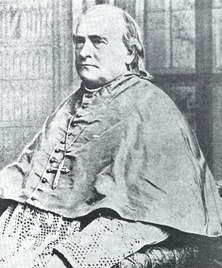Not only is December the month when the world celebrates the dawn of the Lord Jesus Christ, but within the annals of Seton Hall history, the last part of the year is also known for the birth of our first (and third) College President (from 1856-57 and 1859-66), Bishop Bernard J. McQuaid. Born on December 15, 1823, McQuaid was an important figure in the christening of the Catholic College of New Jersey during its early years and the impact of his vision and belief in the worth of higher education lives on through his early and enduring initiatives and memorials in the latter day including McQuaid Hall (Home to the School of Diplomacy) and the McQuaid Medal (the highest honor bestowed on those affiliated with the University) among other landmarks outside South Orange.
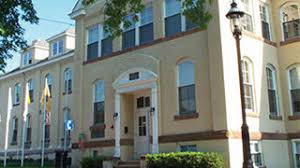
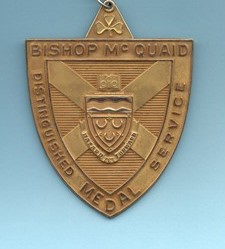
According to The Catholic Encyclopedia (1911) and the seminal work The Catholic Church in New Jersey of 1904 (found online within the Library Guide – https://library.shu.edu/nj-catholic-history and in hard copy form within our Rare Book Collection, Call Numbers – BXZ841.C25 and BXZ1415.N5 F6 1904 respectively), the following highlights have been recorded in relation to the life and legacy of Bishop McQuaid. The trailblazing president of Seton Hall, McQuaid (1823-1909) was born in New York City and his parents were of Irish Catholic origin and the family made history as they played host to the first Mass said in Powel’s Hook (presently known as Jersey City) in 1829. Inspired by his practice in the Catholic faith, McQuaid was educated in Quebec and later at St. John’s Seminary at Fordham prior to his ordination in 1848. He was assigned as a priest to the Diocese of New York and preceding the creation of the See of Newark (five years later) and was made a curate at St. Vincent Martyr in Madison, New Jersey.
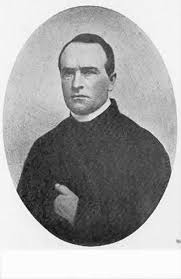
When Bishop James Roosevelt Bayley became the first Bishop of Newark he assigned McQuaid to cover multiple missions including the rectorship of St. Patrick’s Pro-Cathedral in Newark, and co-founding of Seton Hall College along with aid in establishing the Seton Sisters of Charity in Madison during the 1850s prior to becoming Vicar-General of the See in 1866.
During the mid-nineteenth century, the accomplishments made by McQuaid at Setonia were often tied into school firsts. Seton Hall College was initially located in Madison, New Jersey, and commenced operations on September 1, 1856 with an initial enrollment of five students. Those who were included on the registration rolls under the leadership of McQuaid could expect to endure a structured seven-year Classical, Liberal Arts program (three year prep and four year college study) with heavy emphasis on Theology, Philosophy, Latin, Greek and Foreign Language offerings. during his second term as chief executive, McQuaid helped with the move of the Seton Hall College campus from Madison to South Orange in 1860. The College was Incorporated by Act of the New Jersey State Legislature on March 8, 1861. McQuaid also belonged to the first Board of Trustees and co-authorized approval of the first Bachelor of Arts degree (A.B.) that was awarded to Louis Edward Firth in 1862. The earliest corporate seal included the Seton Family coat of arms and image of the Blessed Mary along with the enduring motto — Hazard Zit Forward — “No Matter What The Hazard, Yet Forward” was subsequently designed and adopted by the institution during May 1864 with sanction offered by McQuaid.
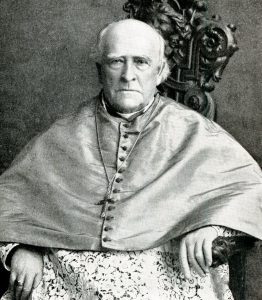
McQuiad was later appointed the first Bishop of Rochester (New York) in 1868 and continued forward with his primary cause of Catholic education in creating a strong parochial school systems, seminary, and was instrumental in working with the State university in the city on collaborative educational initiatives, all of which was generated in earnest during his time at Setonia and served the See of Rochester until his death in 1909.
More details on Bishop Bernard J. McQuaid can be found via our varied collections within the Monsignor William Noé Field Archives & Special Collections Center and the Seton Hall University Libraries. Finding aids and lists can be found via the following links below . . .
Office of the President & Chancellor – Bernard J. McQuaid Papers (SHU 0003-001) – https://archivesspace-library.shu.edu/repositories/2/resources/273
Volumes written by Bishop Bernard J. McQuaid – https://setonhall.on.worldcat.org/search?queryString=au%3D%22McQuaid%2C%20B%20J%22%20AND%20au%3D%22Bernard%20John%22%20AND%20au%3D%221823-1909%22&databaseList=283&expandSearch=true&clusterResults=off
Volumes with Bishop Bernard J. McQuaid as the Subject – https://setonhall.on.worldcat.org/search?clusterResults=off&queryString=bernard+mcquaid
For more information and to inquire about obtaining information off-site or looking into a future research appointment please feel free to contact us by phone at: (973) 275-2378, or via e-mail at: Archives@shu.edu
